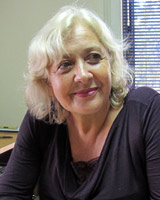Mónica González Mujica of Chile to receive UNESCO/Guillermo Cano World Press Freedom Prize 2010
14-04-2010 (Paris)

Mónica González Mujica
© UNESCO/Carolina Jerez
The Chilean journalist, Mónica González Mujica, a heroine of the struggle against dictatorship in her country, has been named laureate of the 2010 UNESCO/Guillermo Cano World Press Freedom Prize.
“Throughout her professional life, Mónica González Mujica has shown courage in shining the light on the dark side of Chile,” said the President of the jury, Joe Thloloe, Press Ombudsman of the Press Council of South Africa. “She has embodied the very spirit of the Award. She has been jailed, tortured, hauled before the courts but has remained steadfast.”
“Ms González is now ploughing her experience back to the younger generation through her work at the Center of Journalism and Investigation and her workshops on investigative journalism in various countries,” added Mr Thloloe.
In naming the laureate, the Director-General endorsed the recommendation of an international jury of 12 professional journalists from all over the world. “Mónica González Mujica has undergone years of hardship defending freedom of expression, one of the core values UNESCO was created to uphold. She now shows equal commitment to education, which is another main priority of our Organization,” said Ms Bokova.
She will present the Prize to Ms González in a ceremony on 3 May, World Press Freedom Day, which UNESCO will celebrate this year in Brisbane, Australia.
Born in 1949, Ms González spent four years in exile following the military coup of 1973. She returned to Chile in 1978 where harassment from the secret services made her lose jobs repeatedly. As a journalist, she investigated human rights violations as well as the financial doings of General Pinochet and his family.
Ms González was imprisoned and tortured from 1984 to 1985 for this work. Yet, upon her release she went back to investigative reporting, publishing articles and books about the abuses of the military dictatorship. She was detained again and numerous court cases were brought against her.
Since Chile’s return to democracy in 1990, Ms González has continued working as a newspaper editor and journalist. She has been directing the Center of Journalism and Investigation (Santiago, Chile) since 2007, while conducting workshops on investigative journalism in Chile and abroad.
“Ms González is now ploughing her experience back to the younger generation through her work at the Center of Journalism and Investigation and her workshops on investigative journalism in various countries,” added Mr Thloloe.
In naming the laureate, the Director-General endorsed the recommendation of an international jury of 12 professional journalists from all over the world. “Mónica González Mujica has undergone years of hardship defending freedom of expression, one of the core values UNESCO was created to uphold. She now shows equal commitment to education, which is another main priority of our Organization,” said Ms Bokova.
She will present the Prize to Ms González in a ceremony on 3 May, World Press Freedom Day, which UNESCO will celebrate this year in Brisbane, Australia.
Born in 1949, Ms González spent four years in exile following the military coup of 1973. She returned to Chile in 1978 where harassment from the secret services made her lose jobs repeatedly. As a journalist, she investigated human rights violations as well as the financial doings of General Pinochet and his family.
Ms González was imprisoned and tortured from 1984 to 1985 for this work. Yet, upon her release she went back to investigative reporting, publishing articles and books about the abuses of the military dictatorship. She was detained again and numerous court cases were brought against her.
Since Chile’s return to democracy in 1990, Ms González has continued working as a newspaper editor and journalist. She has been directing the Center of Journalism and Investigation (Santiago, Chile) since 2007, while conducting workshops on investigative journalism in Chile and abroad.
Created in 1997 by UNESCO’s Executive Board, the Press Freedom Prize is awarded annually to honour the work of an individual or an organization defending or promoting freedom of expression anywhere in the world, especially if this action puts the individual’s life at risk. Candidates are proposed by UNESCO Member States, and regional or international organizations that defend and promote freedom of expression.
Since its creation, the US $25,000 prize - financed by the Cano and Ottaway family foundations, and by JP/Politiken Newspaper LTD - has been awarded to the following laureates: Lasantha Wickrematunge (Sri Lanka, 2009), Lydia Cacho (Mexico, 2008), Anna Politkovskaya (Russian Federation, 2007), May Chidiac (Lebanon, 2006), Cheng Yizhong, (China, 2005), Raúl Rivero (Cuba, 2004), Amira Hass (Israel, 2003), Geoffrey Nyarota (Zimbabwe, 2002), U Win Tin (Myanmar, 2001), Nizar Nayyouf (Syria, 2000), Jesus Blancornelas (Mexico, 1999), Christina Anyanwu (Nigeria, 1998), Gao Yu (China, 1997).
Since its creation, the US $25,000 prize - financed by the Cano and Ottaway family foundations, and by JP/Politiken Newspaper LTD - has been awarded to the following laureates: Lasantha Wickrematunge (Sri Lanka, 2009), Lydia Cacho (Mexico, 2008), Anna Politkovskaya (Russian Federation, 2007), May Chidiac (Lebanon, 2006), Cheng Yizhong, (China, 2005), Raúl Rivero (Cuba, 2004), Amira Hass (Israel, 2003), Geoffrey Nyarota (Zimbabwe, 2002), U Win Tin (Myanmar, 2001), Nizar Nayyouf (Syria, 2000), Jesus Blancornelas (Mexico, 1999), Christina Anyanwu (Nigeria, 1998), Gao Yu (China, 1997).
Related themes/countries
· Chile
· Press Freedom
· UNESCO/Guillermo Cano World Press Freedom Prize 2010
· World Press Freedom Day 2010
Share this story:
Contact information
- UNESCO Press Release No.2010-41
Source














